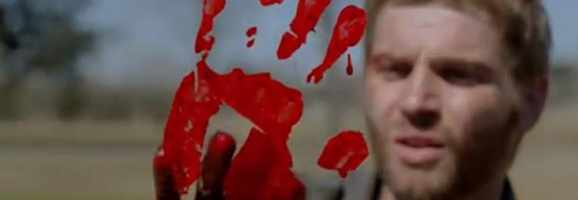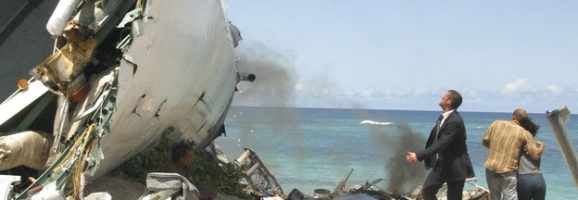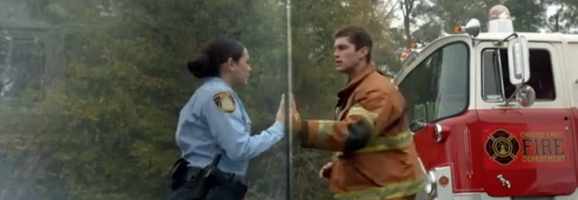Under the Dome: High Concept Disaster Narratives on the Small Screen
13.1 million viewers tuned into CBS Monday night for Under the Dome. Based on Stephen King’s 2009 novel of the same name, the original series welcomes us to Chester’s Mill just minutes before the town and all of its inhabitants are cut off from the outside world by a seemingly impenetrable dome. The highest numbers for a summer premiere in over five years, the ratings bode well for the future of the show, especially with heavyweights Steven Spielberg and Stephen King attached as executive producers. But numbers can be misleading…
Dome stands as the latest in a long line of high concept disaster narratives, often accompanied by a supernatural angle that allows the series to venture into sci-fi/fantasy territory while still commenting on issues of topical importance. By now, we know the drill. Something happens, something that irrevocably changes a group of people, the country, or even the world at large. The occurrence, be it an alien invasion, a zombie apocalypse, or an unforeseen technological breakdown, separates the world that was from the world that is and will never be the same. This isn’t necessarily a new concept on television (recall the murder of a girl named Laura Palmer in the mysterious town of Twin Peaks), but it’s certainly become more popular, especially on broadcast networks.
So where did this trend come from? Is it a response to a plugged-in society, one where our reliance on technology goes unchecked and unquestioned? Many of these series seem to pose the question, “What if it all fell apart?” Maybe it’s a reaction to earth-shattering events like 9/11, or more recently Sand Hook, tragedies that seem to rock the foundation of our society and challenge the way we view the world and each other. Or perhaps it’s simpler than all of that. It could be that in an industry ever-starved for ideas, these “something happens” stories just sell. A juicy premise usually means that viewers will at least walk in the door and that’s half the battle. Whether or not they’ll stay there is the real test, a risk that Under the Dome will inevitably have to face in time.

With the exception of AMC’s mega-hit The Walking Dead, these shows usually find a home on major broadcast networks, often as part of an effort to prove that they can be cool like cable, honest! In fact, a fair amount of these programs were originally developed for basic and premium cable stations. ABC’s FlashForward, which saw everyone on the planet share a combined blackout for two-plus minutes, was developed for HBO and Dome itself was slated for Showtime before entertainment president David Nevins suggested the project be moved to CBS.
It’s hardly a demotion. Shows that aren’t quite bloody, sexy, or crass enough for premium cable often make for risky and daring network fare, especially given the ubiquitous menu of cops, doctors, and lawyers that litter the broadcast schedule. But being more daring than The Mentalist doesn’t guarantee success. Neither do big names, in front of or behind the camera. Lacking in the first category, Dome will have to rely more on the significant street cred of its EPs, but even the name “Steven Spielberg” didn’t save Terra Nova from a short-lived career on Fox. Besides, Spielberg has his name on everything nowadays and his level of creative involvement here is probably minimal at best.
We’ve seen our fair share of alien invasions (Falling Skies, V) and even a nuclear holocaust (Jericho), all subject to varying degrees of success. In the ratings-dominated world of network TV, some have sank (FlashForward, Terra Nova, Alcatraz) and some have swam (LOST, Revolution for now). But what it comes down to is whether or not the concept can support the series. Will Dome be a gimmick or game-changer, or will it fall somewhere in between?
Back in 2004, LOST’s high concept disaster (a plane crash on a mysterious island, as if you didn’t know) had all of the right ingredients at the right time, reinvigorating a broadcast television landscape that was creatively flailing in the shadow of cable. It offered a novel and unmissable mix of high-brow literature (Lord of the Flies) and low-brow reality television (Survivor). What’s more, it provided an innovative flashback scheme that allowed us to fill in the survivors’ backstories piece by piece, discovering a complex and dynamic arc for each character over time. A show with a large ensemble cast that devoted comparable screen-time to everyone was something you’d see on HBO, not on a broadcast network in decline. But ABC took a risk, as they did with Twin Peaks a decade or so earlier.

The character-centric formula captured lighting in a bottle, a perfect paradigm for an emotional resonance that always underscored the show’s hit-or-miss supernatural elements. Even when we groaned about unanswered questions and plot twists for the sake of plot twists, we cared about the characters and continued to watch, largely due to a handful of truly captivating performances. Sure, Matthew Fox breathed too heavily and Evangeline Lilly scrunched up her face too much, but who could forget the knockout turns by Terry O’Quinn, Michael Emerson, and Josh Holloway. These guys were worth tuning in for, even as we grew skeptical that the creators had no clue what they were doing. But that’s where shows like FlashForward and Alcatraz missed the memo! The concepts were compelling enough, but we just didn’t care all that much.
So now we have Under the Dome, a “something happens” narrative spiced with apocalyptic terror, metaphysical crisis, and a profound sense of loss, sure to provide that tangible slice of horror for which Stephen King is so renowned. The result of a thirteen episode pickup that bypassed the pilot process and preemptively dodged the potential for a mid-season cancellation, Season One will air throughout the summer on CBS, where ratings are always through the roof. With four of the five top-rated network shows of the season, the network isn’t exactly starved for attention. Nevertheless, CBS’s reputation for conservative, by-the-numbers programming occasionally receives a welcome kick to the dome.
Of the major networks, CBS seems the most reluctant to shed its bread-and-butter diet of CSI and NCIS-style programs. Known for its episodic detective formats and multi-camera comedies, the network took a risk on Jericho in 2006, but a passionate cult following could only garner a truncated second season after the show was cancelled due to poor ratings. Perhaps Dome is an attempt to diversify the network’s brand in the same way Revolution has for NBC, Fringe has for Fox, and Once Upon a Time has for ABC. CBS’s ultra-successful Person of Interest veers slightly from the network model, but with its eerily plausible look at surveillance in the age of technology, it hardly qualifies as escapism. It’s also not much fun.

So the dome has landed. The “something happens” has happened. These shows thrive on the event itself, LOST‘s epic plane crash, FlashForward‘s blackout, but it’s what happens after that needs to hook us. That dome, we can assume, can only encase the residents of Chester Hill once. Our jaws can only drop at the gruesome bisecting of a cow but one time. Episode Two, directed by the supremely talented LOST alum Jack Bender, should be extremely telling as to where this show will tread from here. The acting seems serviceable, though unspectacular, with a potential standout in Dean Norris. Known as Walter White’s DEA agent brother-in-law on Breaking Bad, he could have some fun with what looks to be a more sinister role. What does “Big Jim” know about the dome? Did he orchestrate the whole thing? The questions have already begun!
It’s yet to be revealed how we’ll be delving into the characters’ lives before the dome. Flashbacks might have a stale, been-there-done-that feel to them. Maybe we’re in for more of a Walking Dead approach, only revisiting the past through conversation because the past is no longer relevant. And how many places can we really go under this dome, enclosed to this finite space? Hopefully, the creators will have enough places for its characters to travel physically, emotionally, and spiritually, and hopefully the answers will satisfy the questions. But, as we all know about television, it’s not the destination that determines a show’s success, but the journey.
What do you think? Leave a comment.











I am certainly going to keep watching the show, and if the rest of the episodes are as good as the first one, this mini-series might just break some ratings records. It is worthy viewing for science fiction fans, as well as anyone who appreciates a good mystery.
The amount of creative influence CBS imposes on this show could have a hand in whether Dome will survive or not. Too much cliched emotional and/or violent pandering used without the strong foundations of a good storyline (a somewhat common recipe used by major networks to attract too wide of an audience — terra nova, Alcatraz,etc) could turn away many potential fans. I feel that the major networks have to realize that even the ordinary Joe can tell what is good tv and what is not. Especially since its the golden age of tv where viewers are exposed to so many great tv shows of all varieties.
“I feel that the major networks have to realize that even the ordinary Joe can tell what is good tv and what is not.” – I think this is the most important and true comment. The question is, HOW can they not realize this?
One of the things I love about King’s novels is the vivid characters, as they make the story work. The”characters” in the series are so changed that they are not even recognizable as being created from the novel and major characters have been removed. I expected some story changes but this is in no way close the the original. One of the worse shows of this year. Made for less intelligent individuals. You know that I am right.
I agree that vivid characterization is one of King’s strong suits. I’m almost finished with The Green Mile and the characters there are so fully formed and complex. The characters in Under the Dome definitely seem like bland archetypes and retreads of previous series, but maybe that’s just the result of trying to introduce a large ensemble cast in forty-some minutes. I hope Stephen King will actually write an episode at some point down the line so we can really delve into these characters and get a taste of that literary flair of his!
I’m not adverse to changes in characterisation between the TV show and the novel – while I love King’s work and enjoyed the novel, it did feel pretty bloated.
I think the amount of interest in the zombie/post-apocalyptic genre has really allowed this high concept disaster narrative to branch off into a successful genre of its own. With all the unpredictability in the modern world, viewers seem to really enjoy watching a group of people try to survive such dramatic, unusual tragedies.
Haven’t seen this yet, but it does sound like an interesting concept. These shows do struggle with the long-time appeal though I think…how can being stuck in a dome stay interesting? Can it? Maybe it can, but I think shows like this often have to resort to crazy plot twists and un-solved mystery after un-sovled mystery pissing viewers off one by one until everyone switches off (my experience with Lost).
I have never heard of this show before, and it seems to me that given that it seems to be imitative in at least some respects, it probably failed to hit the mark.